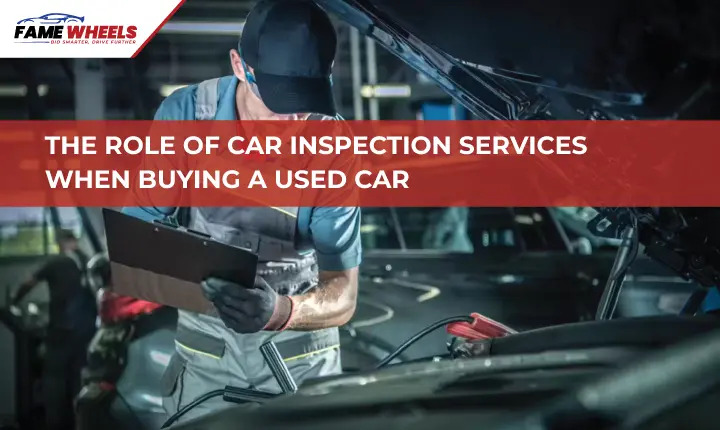Buying a used car in Pakistan can be an excellent decision, offering significant cost savings and access to a wide variety of models. However, it comes with its own set of challenges, primarily ensuring the car’s condition and value. Unlike purchasing a new car, which comes with warranties and assured quality, buying a pre-owned vehicle requires a more careful evaluation to avoid unexpected problems or expenses. This is where professional car inspection services play a crucial role, providing buyers with the confidence and peace of mind they need to make an informed decision.
1. Uncovering Hidden Issues
A used car may look perfect on the surface, with its polished exterior and a freshly cleaned interior. However, underlying mechanical or structural issues can go unnoticed by an untrained eye. Professional car inspections delve deep into the vehicle’s condition, identifying any potential problems that might not be immediately apparent. From engine performance to suspension integrity and brake functionality, a thorough inspection ensures that no critical detail is overlooked. By identifying these issues before making a purchase, buyers can either negotiate a better price or decide to walk away from a potentially bad deal.
2. Verifying the Vehicle’s True Value
Every used car has a unique history that impacts its market value. Factors such as mileage, accident history, previous repairs, and overall wear and tear play a significant role in determining whether the asking price is fair. A professional inspection provides an objective assessment of the car’s condition, helping buyers understand its true value. This is especially important when sellers may overstate the car’s quality or downplay existing issues. With an inspection report in hand, buyers can confidently negotiate a fair price based on the actual state of the vehicle.
3. Ensuring Safety on the Road
Safety should always be a top priority when buying a car, especially a used one. Hidden defects, such as worn-out brakes, faulty airbags, or damaged tires, can pose serious risks to the driver, passengers, and others on the road. A comprehensive car inspection focuses on the safety-critical components of the vehicle, ensuring that it meets roadworthy standards. By addressing these safety concerns upfront, buyers can avoid accidents and costly repairs in the future. This also brings peace of mind, knowing that the car they’re purchasing is dependable and safe to drive.
4. Saving Money in the Long Run
While a professional car inspection may come with an upfront cost, it can save buyers a significant amount of money in the long run. Identifying mechanical issues, worn components, or potential maintenance needs before buying allows buyers to estimate future repair costs. This helps in avoiding vehicles with costly hidden problems that could drain their finances after the purchase. For budget-conscious buyers, this insight is invaluable. It helps them make a financially sound decision and ensures that they don’t exceed their budget due to unforeseen expenses.
5. Building Confidence in Your Purchase
One of the biggest challenges of buying a used car is the uncertainty that comes with it. Many buyers worry about whether the car will hold up over time or if they’re making the right decision. A car inspection provides clarity and confidence by giving buyers a complete picture of the vehicle’s condition. This assurance is particularly helpful for first-time buyers who may not have much experience evaluating cars. Knowing that a trusted professional has vetted the vehicle adds a layer of security to the purchase process.
6. Highlighting the Importance of Vehicle History Reports
While a car inspection focuses on the vehicle’s current condition, it often goes hand-in-hand with a thorough review of the car’s history. Vehicle history reports reveal crucial details such as accident records, service history, odometer readings, and ownership transfers. When combined with an inspection, this information gives buyers a comprehensive understanding of the car’s past and present. For instance, an inspection might identify signs of previous damage or repairs that align with the details in the history report. This dual approach ensures there are no surprises after the purchase.
7. Trustworthy Information for Smart Negotiations
Negotiating the price of a used car can be daunting, especially when the buyer and seller have differing views on the vehicle’s condition. An inspection report serves as a neutral, fact-based document that supports the buyer’s position. Armed with this information, buyers can negotiate effectively, ensuring they pay a price that aligns with the car’s actual condition. Sellers are also more likely to respect an offer backed by professional insights rather than subjective opinions.
8. Avoiding Scams and Lemon Cars
The used car market, while offering excellent deals, can also be a breeding ground for scams. Sellers may try to pass off vehicles with serious mechanical issues or hidden defects as perfectly functional cars. Without an inspection, buyers run the risk of purchasing a “lemon” car that requires constant repairs. A detailed inspection acts as a safeguard, helping buyers spot red flags and avoid being duped. This ensures that their hard-earned money is spent on a reliable vehicle rather than a problematic one.
Conclusion
A car inspection service is an indispensable step in the process of buying a used car. It provides buyers with critical insights into the vehicle’s condition, value, and safety, empowering them to make informed decisions. Whether you’re a first-time buyer or a seasoned car enthusiast, relying on professional expertise ensures you get the best value for your money while avoiding potential pitfalls. In the ever-growing used car market, the role of car inspection services cannot be overstated. They bridge the gap between buyer expectations and seller promises, creating a transparent and trustworthy transaction process. So, before you make that final decision, invest in a professional car inspection—it’s a small step that can lead to a big difference in your car-buying experience.









